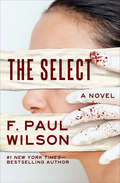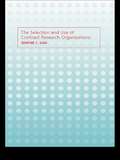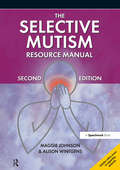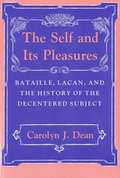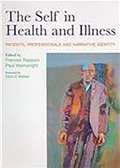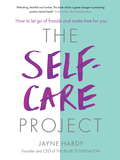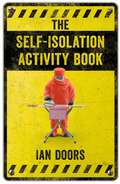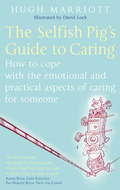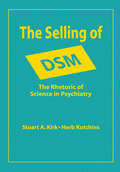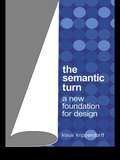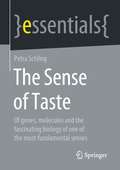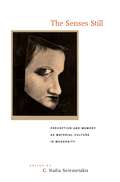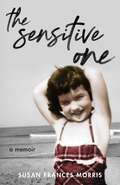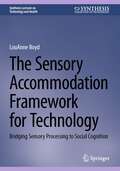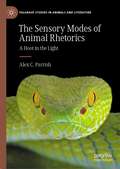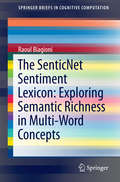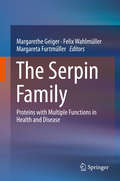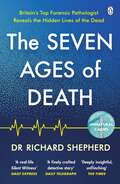- Table View
- List View
The Select: A Novel
by F. Paul WilsonThis “trimmed-to-the-bone medical cliff-hanger” by the New York Times–bestselling author is “as good as the best of Robin Cook” (James Patterson). Any student should consider themselves lucky to receive an invitation to apply to the Ingraham College of Medicine. About an hour outside of Washington, DC, it’s one of the most respected and prestigious institutions of its kind in the United States. With the school completely subsidized by the Kleederman Foundation, students receive a full-ride scholarship for all four years, including room and board. That’s a hard deal for Quinn Cleary to pass up. But after she and her new friend, Tim Brown, gain entrance into this dream school, everything soon becomes a waking nightmare as student after student begins behaving as if they were brainwashed. Now Quinn and Tim must hurry to uncover the dark truth before it’s too late . . .
The Selection and Use of Contract Research Organizations: A Guide For The Pharmaceutical And Medical Device Industries
by Shayne C. GadChoosing the right contract research organization (CRO) can make the difference between getting a product to market quickly and cost-effectively, and wasting valuable time and money. The vast number of available CROs is increasing all the time, and all of them make impressive claims. The Selection and Use of Contract Research Organizations is your
The Selective Mutism Resource Manual: 2nd Edition
by Alison Wintgens Maggie JohnsonFor anyone who needs to understand, assess or manage selective mutism, this is a comprehensive and practical manual that is grounded in behavioural psychology and anxiety management and draws on relevant research findings as well as the authors' extensive clinical experience. Now in its second edition and including new material for adolescents and adults, The Selective Mutism Resource Manual 2e provides: an up-to-date summary of literature and theory to deepen your understanding of selective mutism a wealth of ideas on assessment and management in home, school and community settings so that its relevance extends far beyond clinical practice a huge range of printable online handouts and other resources case studies and personal stories to illustrate symptoms and demonstrate the importance of tailored interventions. This book is essential reading for people who have selective mutism as well as for the clinicians, therapists, educators, caseworkers and families who support them.
The Self and Its Pleasures: Bataille, Lacan, and the History of the Decentered Subject
by Carolyn J. DeanWhy did France spawn the radical poststructuralist rejection of the humanist concept of ‘man’ as a rational, knowing subject? In this innovative cultural history, Carolyn J. Dean sheds light on the origins of poststructuralist thought, paying particular attention to the reinterpretation of the self by Jacques Lacan, Georges Bataille, and other French thinkers. Arguing that the widely shared belief that the boundaries between self and other had disappeared during the Great War helps explain the genesis of the new concept of the self, Dean examines an array of evidence from medical texts and literary works alike. The Self and Its Pleasures offers a pathbreaking understanding of the boundaries between theory and history.
The Self in Health and Illness: Patients, Professionals and Narrative Identity
by Paul Wainwright Frances RapportThis book contains a foreword by Elliot G Mishler - professor of Social Psychology, Department of Psychiatry, Harvard Medical School. Patients' views of their identity change with illness, as do health professionals' views of them. This book discusses how and why this happens, and examines how more awareness of this phenomenon can lead to better care. Providing examples from diverse clinical settings, "The Self in Health and Illness" brings together writers from a range of backgrounds including health science, anthropology, sociology, psychology, nursing, medical ethics and healthcare. It considers the narrative self (or constructions of identity) and its place within healthcare and the medical humanities, and assists in clarifying the understanding of 'self' in the context of illness, health and medicine. An enlightening read for all doctors, especially those with an interest in medical humanities, this anthology is also invaluable for undergraduate and postgraduate students of medical humanities, researchers in health sciences and medical ethics. It will also be of great interest to medical anthropologists, psychologists, psychiatrists and other healthcare professionals. 'If you ask people questions about their lives they tell stories that express some version of "who" they are. Within the healthcare field, narrative researchers from various health professions and social science disciplines have been particularly interested in the potential impact of disability and illness on patient identities. What we find here is an array of quite systematic approaches to the complexities with which people narrate, perform, and possibly transform their identities through their stories. This is a serious undertaking and the editors and authors of these papers treat it with deep respect for our common struggle to make sense of our lives by achieving identities we can live with.' - Elliot G Mishler, in the Foreword.
The Self in Understanding and Treating Psychological Disorders
by Michael KyriosThis must-have reference is a unique exploration of how the individual notion of 'self' and related constructs, such as early schemas and attachment styles, impact on psychopathology, psychotherapy processes and treatment outcomes for psychological disorders across DSM-5, such as depression, bipolar and schizophrenia spectrum disorders, anxiety and trauma, eating disorders, obsessive-compulsive and related disorders, autism, personality disorders, gender identity disorder, dementia and somatic problems such as chronic fatigue syndrome. It discusses the role of the concept of self in a wide range of existing theoretical and treatment frameworks, and relates these to real-life clinical issues and treatment implications. Emphasizing the importance of integrating an awareness of self constructs into evidence-based conceptual models, it offers alternative practical intervention techniques, suggesting a new way forward in advancing our understanding of psychological disorders and their treatment.
The Self-Care Project: How to let go of frazzle and make time for you
by Jayne Hardy'Refreshing, heartfelt and humble...a game changer in promoting positive mental health' Sarah Turner, bestselling author of THE UNMUMSY MUMThere's a damaging misconception in society that putting ourselves first is an act of selfishness. But self-care is not just a millennial buzzword. Without the restorative power of self-care, how will we ever escape the vicious circle where we're sick and fed-up of feeling sick and fed-up? Self-care is a tool, accessible to us all, which helps us to take responsibility for our own happiness - our physical, emotional, psychological and social needs. Jayne Hardy, founder and CEO of The Blurt Foundation, argues that it is the best preventative measure available to us to combat overwhelmedness, stress and ill health, in our hectic, modern world. The Self-Care Project is for those who have been feeling off-kilter for a while but have not been able to put the finger on the 'why'. It is a no-nonsense, practical journey to help you do just that. It'll walk you through the case for self-care (why it's so darn important), why it isn't selfish at all, help you explore what self-care means for you, what your obstacles might be and provide advice on how to chisel out daily space for self-care in a practical, achievable and realistic way.'Reading this is like a therapy session with a trusted, empathetic friend determined to help you turn things around, minus any irritating self-righteousness' The Independent
The Self-Care Project: How to let go of frazzle and make time for you
by Jayne HardyEverything you need to know about self-care; what it is, why it's important, why it's such a struggle and how to integrate it into day-to-day life.There's a damaging misconception in society that putting ourselves first is an act of selfishness. But self-care is not just a millennial buzzword. Without the restorative power of self-care, how will we ever escape the vicious circle where we're sick and fed-up of feeling sick and fed-up? Self-care is a tool, accessible to us all, which helps us to take responsibility for our own happiness - our physical, emotional, psychological and social needs. Jayne Hardy, founder and CEO of The Blurt Foundation, argues that it is the best preventative measure available to us to combat overwhelmedness, stress and ill health, in our hectic, modern world. The Self-Care Project is for those who have been feeling off-kilter for a while but have not been able to put the finger on the 'why'. It is a no-nonsense, practical journey to help you do just that. It'll walk you through the case for self-care (why it's so darn important), why it isn't selfish at all, help you explore what self-care means for you, what your obstacles might be and provide advice on how to chisel out daily space for self-care in a practical, achievable and realistic way.
The Self-Isolation Activity Book
by Ian Doors'Extremely silly, fiendishly clever, genuinely helpful and very, very funny' Bruno Vincent, bestselling author of Five on Brexit IslandAre you stuck inside, bored out of your brain, desperate for things to do? Looking to fill the ever-diminishing gap between stopping drinking coffee and starting drinking booze? Has the incessant comforting warmth of your laptop on top of your lap started to genuinely freak you out? Then you need The Self Isolation Activity Book. Written by Ian Doors, a man who spent all of his time alone in his flat ages before you all started doing it. Packed full of quick and easy activities, including games, mental exercises and colouring in, as well as handy hints and kitchen cupboard food and drink tips, this is the only book you'll need to make the most of your time inside. Also, the last few pages can be ripped out and used as toilet paper. Can't help but feel like all other books are missing a trick there.
The Self-Isolation Activity Book
by Ian Doors'Extremely silly, fiendishly clever, genuinely helpful and very, very funny' Bruno Vincent, bestselling author of Five on Brexit IslandAre you stuck inside, bored out of your brain, desperate for things to do? Looking to fill the ever-diminishing gap between stopping drinking coffee and starting drinking booze? Has the incessant comforting warmth of your laptop on top of your lap started to genuinely freak you out? Then you need The Self Isolation Activity Book. Written by Ian Doors, a man who spent all of his time alone in his flat ages before you all started doing it. Packed full of quick and easy activities, including games, mental exercises and colouring in, as well as handy hints and kitchen cupboard food and drink tips, this is the only book you'll need to make the most of your time inside. Also, the last few pages can be ripped out and used as toilet paper. Can't help but feel like all other books are missing a trick there.
The Self-Regulation of Health and Illness Behaviour
by Linda D. Cameron Howard LeventhalSelf-regulation theory focuses on the ways in which individuals direct and monitor their activities and emotions in order to attain their goals. It plays an increasingly important role in health psychology research.The Self-regulation of Health and Illness Behaviour presents an up-to-date account of the latest developments in the field. Individual contributions cover a wide range of issues including representational beliefs about chronic illness, cultural influences on illness representations, the role of anxiety and defensive denial in health-related experiences and behaviours, the contribution of personality, and the social dynamics underlying gender differences in adaptation to illness. Particular attention is given to the implications for designing effective health interventions and messages. Integrating theoretical and empirical developments, this text provides both researchers and professionals with a comprehensive review of self-regulation and health.
The Selfish Pig's Guide To Caring: How to Cope With the Emotional and Practical Aspects of Caring for Someone
by Hugh MarriottSix million people in the UK, often unnoticed by the rest of us, provide unpaid care for disabled or elderly relatives, friends or neighbours. Their job is long, lonely and hard, yet there is limited support and no formal training. As a result, carers suffer frequent damage to physical and mental health.Oddly, though carers by definition are anything but selfish pigs, they are liable to feelings of guilt, probably brought on by fatigue and isolation. So Hugh Marriott has written this book for them - and also for the rest of us who don't know what being a carer is all about. His aim is bring into the open everything he wishes he'd been told when he first became a carer. And he does. The book airs such topics as sex, thoughts of murder, and dealing with the responses of friends and officials who fail to understand.This is a must-read for anyone involved with caring.
The Selfish Pig's Guide To Caring: How to cope with the emotional and practical aspects of caring for someone
by Hugh MarriottSix million people in the UK, often unnoticed by the rest of us, provide unpaid care for disabled or elderly relatives, friends or neighbours. Their job is long, lonely and hard, yet there is limited support and no formal training. As a result, carers suffer frequent damage to physical and mental health.Oddly, though carers by definition are anything but selfish pigs, they are liable to feelings of guilt, probably brought on by fatigue and isolation. So Hugh Marriott has written this book for them - and also for the rest of us who don't know what being a carer is all about. His aim is bring into the open everything he wishes he'd been told when he first became a carer. And he does. The book airs such topics as sex, thoughts of murder, and dealing with the responses of friends and officials who fail to understand.This is a must-read for anyone involved with caring.
The Selling of DSM: The Rhetoric of Science in Psychiatry (Social Problems And Social Issues Ser.)
by Stuart A. KirkWhen it was first published in 1980, the Diagnostic and Statistical Manual of Mental Disorders, Third Edition—univer-sally known as DSM-III—embodied a radical new method for identifying psychiatric illness. Kirk and Kutchins challenge the general understanding about the research data and the pro-cess that led to the peer acceptance of DSM-III. Their original and controversial reconstruction of that moment concen-trates on how a small group of researchers interpreted their findings about a specific problem—psychiatric reliability—to promote their beliefs about mental illness and to challenge the then-dominant Freudian paradigm.
The Semantic Turn: A New Foundation for Design
by Klaus KrippendorffResponding to cultural demands for meaning, user-friendliness, and fun as well as the opportunities of the emerging information society, The Semantic Turn boldly outlines a new science for design that gives designers previously unavailable grounds on which to state their claims and validate their designs. It sets the stage by reviewing the h
The Sense of Taste: Of genes, molecules and the fascinating biology of one of the most fundamental senses (essentials)
by Petra SchlingIn this essential, Petra Schling gives an overview of the current state of research on the topic of taste. She regards taste as a sensory perception that allows us to distinguish essential food components from toxins. What we eat depends not insignificantly on how we like it. But how do we actually taste - and what do we taste? As omnivores, we humans have a relatively wide range of taste receptors, not only in our mouths, which provide us with important information about our food. Outside the mouth, taste receptors serve our innate immune system to "taste" bacteria, worms and other intruders. We can and should rely on this. Our sense of taste warns us of toxins and unwanted co-inhabitants and can only be deceived to a very limited extent by sweeteners, bitter blockers or similar tricks.This Springer essential is a translation of the original German 1st edition essentials,Der Geschmack by Petra Schling, published by Springer Fachmedien Wiesbaden GmbH, part of Springer Nature in 2021.The translation was done with the help of artificial intelligence (machine translation by the service DeepL.com). A subsequent human revision was done primarily in terms of content, so that the book will read stylistically differently from a conventional translation. Springer Nature works continuously to further the development of tools for the production of books and on the related technologies to support the authors.
The Senses Still: Perception and Memory as Material Culture in Modernity
by C. Nadia SeremetakisWhat has happened to regional experiences that identify and shape culture? Regional foods are disappearing, cultures are dissolving, and homogeneity is spreading. Anthropologist and award-winning author of The Last Word: Women, Death, and Divination in Inner Mani, C. Nadia Seremetakis brings together essays by five scholars concerned with the senses and the anthropology of everyday life. Covering a wide range of topics—from film to food, from nationalism to the evening news—the authors describe ways in which sensory memories have preserved cultures otherwise threatened by urbanism and modernity. <p><p> The contributors are Susan Buck-Morss, Allen Feldman, Jonas Frykman, C. Nadia Seremetakis, and Paul Stoller. <p> C. Nadia Seremetakis is Advisor to the Minister of Public Health in Greece and visiting professor at the National School of Public Heath in Athens. She is the author of The Last Word: Women, Death, and Divination in Inner Mani, available from the University of Chicago Press.
The Sensitive One: A Memoir
by Susan F. MorrisAt age fifty, Susan Morris is diagnosed with breast cancer—and she&’s floored. Desperate to pinpoint the cause, one night she decides to type a question into her search engine: &“What are the risk factors of getting breast cancer?&” She&’s surprised to discover research showing that long-term exposure to stress and traumatic childhood experiences can both increase the risk of breast cancer. The Sensitive One is a braided memoir that alternates between Morris&’s childhood—as a sensitive child and then teenager who shouldered the burden of caring for her younger siblings as her dad&’s alcoholism tore at the threads of their home life—and an adult who for a decade-plus has been living a trauma-free life with a caring husband and rewarding career in nursing . . . only to be diagnosed with breast cancer. This is a story of redemption—of a woman who manages to escape harrowing circumstances and start anew—but it&’s also a story of how our legacy lives within us, and how healing from the adverse effects of childhood can truly take a lifetime.
The Sensory Accommodation Framework for Technology: Bridging Sensory Processing to Social Cognition (Synthesis Lectures on Technology and Health)
by LouAnne BoydThis book provides a thorough introduction to the many facets of designing technologies for autism, with a particular focus on optimizing visual attention frameworks. This book is designed to provide a detailed overview of several aspects of technology for autism. Each Chapter illustrates different parts of the Sensory Accommodation Framework and provides examples of relevant available technologies. The books first discusses a variety of skills that make up human development as well as a history of autism as a diagnosis and the birth of the neurodiversity movement. It goes on to detail individual types of therapy and how they interact with autism. The systems involved in sensory processing and their specific relation to autism are then explored, including through technologies that have addressed these areas and applications for designers. Readers will learn about designing sensory environments and sensory interactions, such as through virtual reality. This book places a needed emphasis on the hierarchy of information in technology development by exploring visual attention in neurodivergent conditions like autism, ADHD, and dyslexia. It also delves into the relationship between sensory perception and nonverbal communication, the bridge between sensory input and social behavior, and dynamic information. The discussion is rounded out with examinations of temporal processing as and multisensory integration as complicating factors that have existing technological solutions. Finally, the book closes with a summary of the sensory accommodation framework in respect to how each layer offers different user experience goals and specific mechanisms to promote those goals. Readers from a variety of research backgrounds will find this book informative and useful, while designers will learn essential skills for effectively designing autism technologies.
The Sensory Modes of Animal Rhetorics: A Hoot in the Light (Palgrave Studies in Animals and Literature)
by Alex C. ParrishThe Sensory Modes of Animal Rhetorics: A Hoot in the Light presents the latest research in animal perception and cognition in the context of rhetorical theory. Alex C. Parrish explores the science of animal signaling that shows human and nonhuman animals share similar rhetorical strategies—such as communicating to manipulate or persuade—which suggests the vast impact sensory modalities have on communication in nature. The book demonstrates new ways of seeing humans and how we have separated ourselves from, and subjectified, the animal rhetor. This type of cross-species study allows us to trace the origins of our own persuasive behaviors, providing a deeper and more inclusive history of rhetoric than ever before.
The Sensory Processing Disorder Answer Book: Practical Answers to the Top 250 Questions Parents Ask
by Tara DelaneyThe Sensory Processing Disorder Answer Book provides advice and answers to your most pressing questions about SPD. Written in a question and answer format, The Sensory Processing Disorder Answer Book helps you understand SPD, conquer your fears, and seek help for your child when necessary.
The SenticNet Sentiment Lexicon: Exploring Semantic Richness in Multi-Word Concepts
by Raoul BiagioniThe research and its outcomes presented in this book, is about lexicon-based sentiment analysis. It uses single-, and multi-word concepts from the SenticNet sentiment lexicon as the source of sentiment information for the purpose of sentiment classification. In 6 chapters the book sheds light on the comparison of sentiment classification accuracy between single-word and multi-word concepts, for which a bespoke sentiment analysis system developed by the author was used. This book will be of interest to students, educators and researchers in the field of Sentic Computing.
The Serotonin Power Diet
by Judith J. Wurtman Nina FrusztajerFood plan with various stages to it. Its intent is to keep serotonin levels in the body high. Contains recipes.
The Serpin Family
by Margarethe Geiger Felix Wahlmüller Margareta FurtmüllerThe book provides an comprehensive overview on biology, genetics and cellular functions of serpins (serine protease inhibitors) in health and disease. With over 1000 members serpins are the most diverse family of protease inhibitors. Latest groundbreaking research findings are presented and broaden the understanding on inhibitory and non-inhibitory serpins, not only in mammalian organisms but also in insects, worms, plants and viruses.
The Seven Ages of Death: ‘Every chapter is like a detective story’ Telegraph
by Dr Richard ShepherdThe heart-wrenchingly honest new book about life and death from forensic pathologist and bestselling author of UNNATURAL CAUSES, Dr Richard ShepherdA TIMES AND SUNDAY TIMES BOOK OF THE YEAR'Deeply insightful. Unflinching' THE TIMES'A finely-crafted detective story' DAILY TELEGRAPH'Enlightening, strangely uplifting' DAILY MAIL'Fascinating' DAILY EXPRESS_________Dr Richard Shepherd, a medical detective and Britain's top forensic pathologist, shares twenty-four of his most intriguing, enlightening and never-before-told cases.These autopsies, spanning the seven ages of human existence, uncover the secrets not only of how a person died, but also of how they lived.From old to young, murder to misadventure, and illness to accidental death, each body has something to reveal - about its owner's life story, how we age, justice, society, the certainty of death.And, above all, the wonderful marvel of life itself._________Praise for Dr Richard Shepherd'Gripping, grimly fascinating, and I suspect I'll read it at least twice' Evening Standard'A deeply mesmerising memoir of forensic pathology. Human and fascinating' Nigella Lawson'An absolutely brilliant book. I really recommend it, I don't often say that but it's fascinating' Jeremy Vine, BBC Radio 2'Puts the reader at his elbow as he wields the scalpel' Guardian'Fascinating, gruesome yet engrossing' Richard and Judy, Daily Express'Fascinating, insightful, candid, compassionate' Observer
